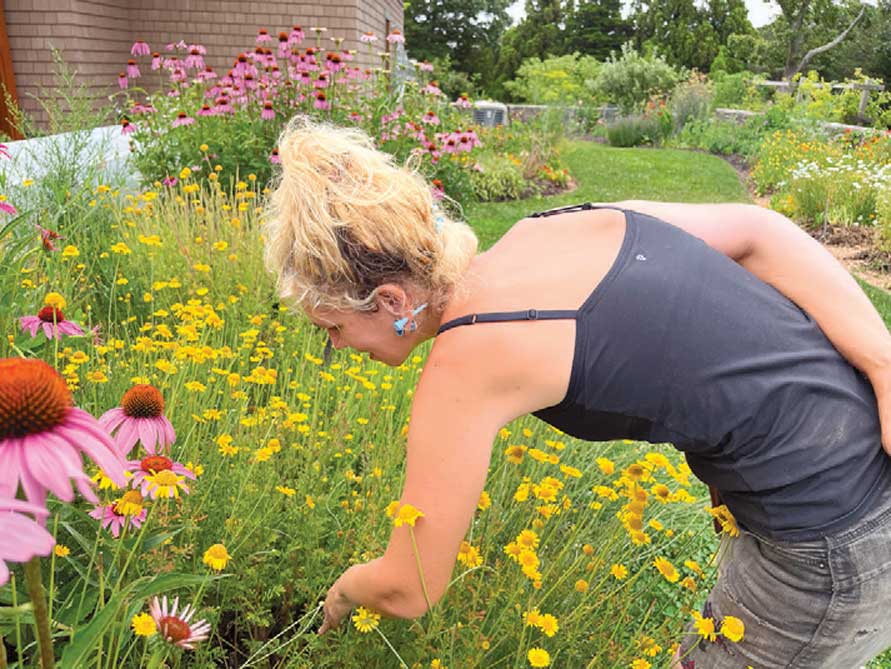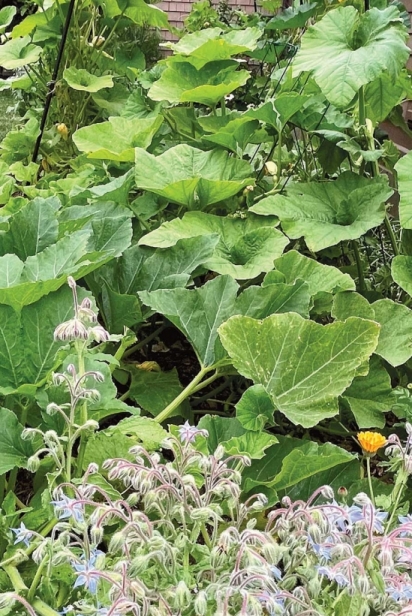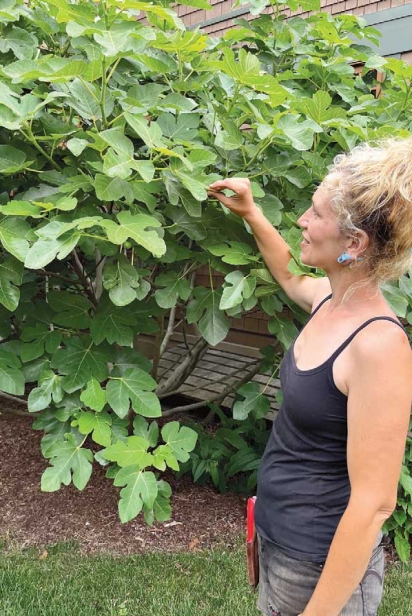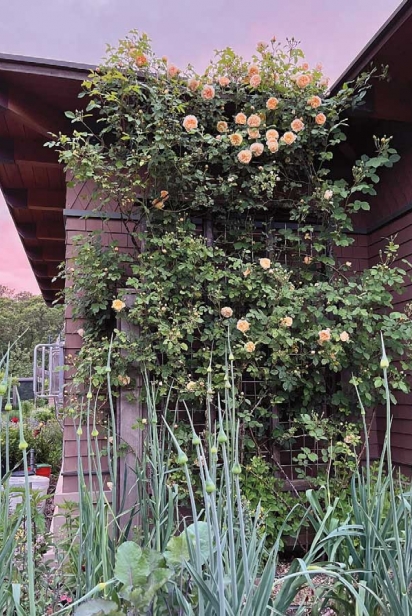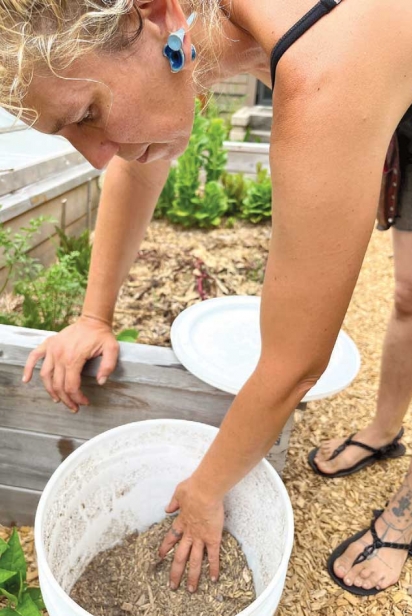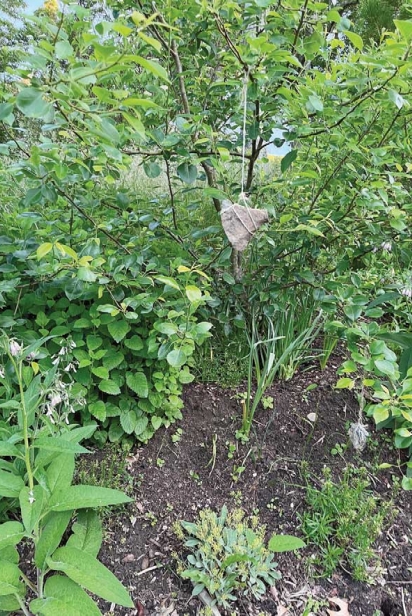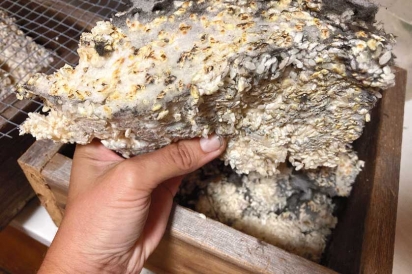Growing Ethically
Ferments, tinctures, soil drenches and fish guts; Jessica Tsoukalas’ distinctive approach to caring for the land rests on permaculture and Korean natural farming (KNF) principles. “It’s not about optimum yields,” she says. “Growing heals the land, our bodies and our relationships. At its best, it creates oneness.”
A talented artist and seamstress, Tsoukalas studied ceramics at MassArt, Boston, choosing to hand-build many of her large-scale pieces. Her background in design and mold-making experience landed her a unique position at Harvard creating anatomically exact replicas of female anatomy. Mid-career physicians practice on these models, perfecting their skills in minimally-invasive, laparoscopic procedures. A novel opportunity, yes, albeit not for the faint of heart, as Tsoukalas fashioned these silicone molds based on tissue samples she trimmed from cadaver pigs. “Doctors all over the country trained on my creations before performing the actual surgeries on their patients,” she says. “I became so aware of anatomy and adept at suturing that it was suggested I pursue a career as a physician’s assistant.”
Yearning for time in the outdoors, Tsoukalas returned to Cape Cod, becoming Truro Castle Hill Center for the Arts’ Ceramics Studio Manager. Born in Provincetown, her family moved to the Worcester area when she was five. “I love the Cape and feel so fortunate that three years ago my partner and I could purchase a house here. Before that, to remain here, we had rented just about every possible type of accommodation, some nearly uninhabitable. Yet still, I have survivor’s guilt that we succeeded in buying a home.”
By contrast, one of the most carefully tended and magical properties Tsoukalas ever lived in, a rental in Wellfleet, included established beehives, a lovely growing space, and an eagle that visited often. At the time, she worked part-time helping a physically-challenged woman garden. “My client did the more fastidious tasks that she was able to accomplish, and the heavy lifting and moving were on me. We were quite the team,” says Tsoukalas. “Although sadly she has passed, I still have two peach trees grown from saplings given to us by someone strolling by who had watched us work together.”
Having done a bit of growing since childhood, in 2016 Tsoukalas began to study natural farming and permaculture and discovered Korean Natural Farming (KNF). “KNF is a whole food system that captures, cultivates and amplifies the indigenous microorganisms in the land we grow on,” she says.
Introduced in 1955, the Korean Natural Farming techniques were created by the Korean born Han-Kyu Cho (Master Cho). Cho urged farmers to reject commercial fertilizers and pesticides that were once the product of surplus chemicals from WWII. He taught farmers to grow using the plants growing locally and abundantly near them. His teachings, based on the principle “You and I are one,” inspire farmers to see the land, the food they grow, and each other as interconnected. By relying on the natural world, growers could make choices that are good for the planet and people.
KNF uses locally available ingredients to create “inputs,” usually in a liquid form, that are specifically tailored to the growth state the plant is in at the time: vegetative (actively growing,) flowering, or producing fruit. With curious acronyms like IMO (indigenous microorganisms,) FPJ (fermented plant juice), and OHM (Oriental herbal medicine), each preparation contributes to strengthening the plant nutritionally and defending against disease, often fending off predators.
Microscopic in size, indigenous microorganisms include fungi, bacteria, protozoa and nematodes. Once caught, stabilized, and in some instances, composted, solutions are made and they’re ready to be used. Mixtures tailored to each plant’s growth stage are applied at appropriate intervals to the plants themselves or to the soil. Other preparations, made from locally available and low- or no-cost sources like egg shells, vinegar and seaweed, help boost plant nutrition by making minerals more available to the plant. Fermented fruit and plant juices, Oriental herbal medicine, and lactic acid are examples of the classic KNF “recipes” that can help feed, heal and cleanse degraded soil. Tsoukalas says, “Initially one looks at these as complicated approaches, yet the important thing is just starting. There’s a lot you can do by simply beginning with substances that naturally contain microbes like the seawater all around us.”
Younsang Cho, the son of KNF’s founder, Master Cho, continued in his father’s path, creating JADAM. Similar in principle to KNF, his methods include specific organic pesticides to bolster a plant’s defense against insects. The name JADAM translates from the Korean “Jayonul Damun Saramdul” to “people who are like nature.”
Compelled to learn KNF, Tsoukalas dove in, studying with Chris Trump, one of its first practitioners in the United States. Having completed a week-long training course in Boise Idaho, she’s a Certified Soil Smith by Chris Trump of Natural Farming (and has taught the 5-day KNF competency course). In 2022, Trump teaches in California, Ireland, Tennessee, France, and Truro, MA, where Tsoukalas hopes to visit him in October. Similarly, after experiencing Qigong, a part of ancient Chinese medicine, Tsoukalas was transformed and ready to study the practice that includes physical movements and breathing. Traveling to New York state for weekend sessions to learn more, she received her Wu Ming Qigong certification in 2018, and is qualified to teach the ancient art. Similarly, already fermenting her own foods for over a decade, she ramped up her study of using herbs as medicine and now regularly donates jars of the healing calendula-infused salves she makes to the clients at Hyannis’ Independence House. Tsoukalas says, “I’m very process driven. That’s how I learn, it’s all hands-on, by doing. “Now Tsoukalas is studying for a Permaculture Design Certification, taking an online twenty-eight-week program with the Australian English-born Permaculture expert, Geoff Peyton. Permaculture is an approach to agriculture that is sustainable and resilient and based on natural ecosystems. It involves three principles; fair share, earth share and people share. As such it is a much broader, more systemic way to look at garden design then organic growing as it includes not only what we grow, but how we grow it, sustain the health of the land and each other, and how we share what we’ve grown with others, including animals.
Five years ago, Tsoukalas accepted a job overseeing a threeacre parcel in South Orleans. Located on high bank shoreline across from Simpson’s Island on Little Pleasant Bay, the clients allow her free range to experiment and segue into a methodology synthesizing her knowledge of KNF, Permaculture and other organic systems. Now Tsoukalas is here three days a week with an assistant. However, achieving its current status has taken her working (then solo), often six days per week, ten months a year.
Flowering plants, herbs, deciduous and evergreen shrubs and trees, fruit trees (cherry and apple), and vegetables flow in and around the property. Newly-built rock walls punctuated with glacial rocks found onsite delineate the different outdoor areas. Paths meander through bright and dappled sunlight, with one winding into damp shadows at the edge of the woods.
All gardens are no-dig, and deeply mulched to retain water and suppress weed growth, initially with cedar chips that were brought in, but now using compost wholly created onsite. Herbs intermingle with berries and flowers and vegetables of every variety. “One of the things we try to do with these methods is to design ‘guilds’ of plants that work together. For example, a black locust may tower over a peach tree, providing a bit of shade, while below thrives an understory of smaller plants and herbs. I try to choose species with a time of flowering matching the peach tree’s so that pollinators attracted to their scent will help to pollinate the peach tree,” says Tsoukalas. “It’s a process of my learning about the land as well; I watch and adjust each year that I’m here.”
On a late May Day, the bearded iris have just triumphed. Nettles grow beneath staked raspberry canes. One raised bed holds varied kinds of garlic and Egyptian onion; lettuce and pak choi fill another. Stands of cilantro will soon go to seed. Multiple varieties of high bush blueberry thrive. Nearby, a mammoth fig tree anchors one corner of the house. A pomegranate that should fruit in a few years is paired with a camellia. Peeking into a small greenhouse area inside the home and adjacent to the client’s kitchen, one spots ginger, mango, and fresh turmeric. Outdoors again, a fabric-wrapped low tunnel protects brassicas: cabbage and Brussels sprouts. Asked about the large rocks suspended by twine like gifts from the fruit trees, Tsoukalas says, “Branches that extend laterally instead of upward promote more prolific fruiting, and so I try to train them downward while they’re young.”
Rose bushes flush with massive flowers on robust unblemished stems punctuate the expansive porch that spans the width of the house. Stretching four feet across and six feet high, this intense pink variety was one of the few selected for its hue; nearly every other variety, almost all David Austen, was chosen for scent. One particular bush, illuminated with blooms of gleaming yellow and better described as a tree, exceeds the two-story roofline.
As she has for every bit of this property, Tsoukalas hand-picked species that would thrive in its varying environments. In one area cranberries and marsh mallow are planted with their feet in the moist woodland. A botanical sleuth, she seeks out obscure nurseries and rare seed purveyors to land each treasure.
“In considering a farmer’s bottom line,” says Tsoukalas, “KNF and JADAM, in particular, are low cost enough that even the poorest farmer can implement them and see not only healthier plants and soil, but a bigger profit. In the effort to create more of a closed loop system, I make all my own inputs and as much compost as I can. We no longer buy inputs or take organic materials to the dump. This has saved clients literally thousands of dollars!”
“KNF practitioners,” says Tsoukalas, “are generally a tight group, very passionate about what they do. There is such a camaraderie and joy knowing that we are working with nature to heal the earth and each other. Even if you can only access a 10’ x 10’ area, create that space thoughtfully and it will do a lot of good for the environment.”
Three years in, Tsoukalas’ own property is beginning to take form, conceptually and literally. In the driveway rests a massive black tub. Brewing in the rainwater within are garlic, seaweed, worm castings and a bag of leaf litter gurgling around a small aerator suspended in the nutrient-rich compost tea used as a foliar spray and a soil drench. Stacked in a spacious clearing within the limbs of massive cedar are Jenga-like piles of logs, each injected with different varieties of Shiitake mushroom spore.
“That first year, I waited and I watched the land. Then I ripped out yards of bittersweet that tangled high into the trees. My good friends just helped me dig out these swales (trenches with gently sloping sides) that I designed, that will help with water retention. I’ve got fruit trees, perennial kiwis, and raspberries already planted in,” she says. “In this square raised bed here are several hundred saplings I’m sprouting from seed to donate as free trees as part of the world-wide trillion tree planting campaign endorsed by Amma, an Indian humanitarian and spiritual leader.”
Tsoukalas’ hope is to launch a nursery for fruiting, native and rare plants and trees, as well as to have indoor space for workshops in KNF and Qigong. Named for Zeus’ daughter, the Goddess of the moon and the hunt, who loved nature and dancing in the forest, it will be called The Artemis Guild. Anticipated opening is Fall 2022.
“Many times in my life I’ve been very private, and stayed within myself,” says Tsoukalas. “Yet I’ve had a shift. There’s a lot of healing to be done in the world; of the land and of ourselves. There is a Hawaiian value and practice that Chris Trump taught us, ‘kuleana.’ Once each of us has an understanding of something, kuleana is the responsibility that we carry forward having that knowledge. I’m ready to share and help others begin.”
Jessica Tsoukalas consults, offering site visits – “Walk and Talks” – to discuss plants, placement, water, permaculture and natural farming (KNF/JADAM) solutions. Specific topics can include: Garden design and/or installation; Training landscape crews; Sun and shade gardens; Outdoor mushroom cultivation instruction; Food, medicine, pollinator, and ornamental integrated ecosystems; General pruning; Rose care; Creating natural farming inputs; Natural farming classes – group and individual instruction; and Wu Ming Qigong classes – Breast Health sequence and Dragons Way Program.
On Instagram: @muffinhorsebird @theartemisguild


